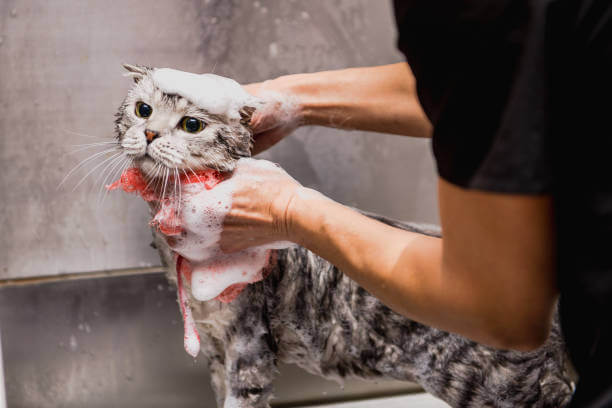Are you wondering if it’s safe to use dog shampoo on cats? We’ve got the answer. Find out what you need to know about using canine products for feline friends. When it comes to taking care of our pets, there are many questions that can arise. One of the most common questions pet owners have is whether or not they can use dog shampoo on their cats. The answer isn’t a simple yes or no, as there are many factors to consider when deciding which type of shampoo is best for your feline friend.

We’ve compiled all the information you need to know about using dog shampoo on cats, so you can make an informed decision for your furry companion. The topic of using dog shampoo on cats has been a controversial one, with many conflicting opinions and information available. In this article , we will explore the potential benefits and risks of using dog shampoo on cats, as well as providing alternative options for keeping your cat’s coat clean and healthy.
Is it ok to use dog shampoo on cats?
The short answer is no, it’s not safe to use dog shampoo on cats. While both dogs and cats are mammals, they have different skin pH levels and coat types. Dog shampoos are formulated specifically for the pH balance and coat type of canines, which can be harsh and irritating to a cat’s delicate skin.
Cats have thinner, sensitive skin that is more prone to irritation and allergic reactions. Dog shampoos may contain harsh chemicals or fragrances that can cause skin irritation and even lead to serious health issues for your feline friend. Additionally, cats are known to groom themselves excessively, meaning they may ingest the shampoo while grooming, which can also result in digestive problems.
Why can’t you use just any dog shampoo on cats?
Aside from the potential dangers to your cat’s skin and health, using dog shampoo on cats can also affect the effectiveness of the product. As mentioned before, cat and dog skin have different pH levels. The normal range for a dog’s skin pH is 6.2-7.4, while a cat’s skin pH is lower at 5.5-7.0. Using a dog shampoo with a higher pH on a cat’s skin can disrupt the natural balance, leading to dryness and irritation.
Additionally, cats have different coat types than dogs. Cat fur is finer and more prone to tangling, while dog fur is typically coarser and thicker. This means that a dog shampoo may not effectively clean or nourish a cat’s coat, leaving it dry and dull.
Is There Shampoo for Both Dogs and Cats?
Yes, there are shampoos specifically designed for both dogs and cats. These products usually have a neutral pH balance that is safe for use on both species. However, it’s important to read the labels and ingredients carefully to ensure that the product is suitable for your pet’s specific needs. We recommend consulting with your veterinarian before using any shampoo, as they can recommend the best product for your cat based on their individual needs and health. We also recommend doing a patch test on a small area of your cat’s skin before using any new product to check for any adverse reactions.
Why can you use dog flea shampoo on cats?
One exception to the rule of not using dog shampoo on cats is flea shampoos. Dog flea shampoos contain the same active ingredients as cat flea shampoos, but in different concentrations. While it may be tempting to use a dog flea shampoo on your cat if you run out of their own, it’s important to remember that cats are more sensitive to these chemicals and can easily become sick from an overdose.
It’s always best to consult with your veterinarian before using any flea treatment on your cat, as they can recommend the safest and most effective option for your feline friend. We also recommend checking with your veterinarian if you are considering using a dog flea shampoo on your cat, as they can advise on the correct dosage and frequency of use.

What is the Difference Between a Cat’s Skin and a Dog’s Skin?
As mentioned before, cats and dogs have different skin pH levels. Cats also have a thinner epidermis (outer layer of skin) than dogs, making them more susceptible to irritants and chemicals. Cat skin also produces less oil than dog skin, which means it can dry out more easily. We also mentioned the difference in coat types, with cats having finer hair that requires a gentler touch when it comes to grooming products.
Additionally, cats have a higher sensitivity to essential oils and fragrances, often found in dog shampoos, due to their unique liver structure. Cats lack an enzyme that breaks down these chemicals, making them more prone to toxic reactions if exposed.
Can You Use Human Shampoo on Cats?
No, it is not recommended to use human shampoo on cats. Human shampoos are not suitable for the delicate skin and coat of felines. They are often formulated with harsh chemicals and fragrances that can be harmful to cats. Human shampoos may also strip away the natural oils in a cat’s skin, leading to dryness and irritation. We recommend sticking to products specifically designed for cats or consulting with your veterinarian before using any new product. The same rule applies to using cat shampoo on dogs; it is not recommended as it may not effectively clean or nourish a dog’s coat.
Final Thought
In conclusion, using dog shampoo on cats is not recommended. The pH levels and coat types of dogs and cats differ significantly, making dog shampoos potentially harmful to feline friends. While there are shampoos formulated for both species, we recommend consulting with your veterinarian before using any new product on your cat’s sensitive skin. When it comes to flea treatment, always check with your veterinarian and never use a dog flea shampoo on your cat without their approval. Ultimately, it’s best to stick to products specifically designed for cats to ensure the health and well-being of our beloved feline companions.
So, in answer to the question “Can You Use Dog Shampoo on Cats?” – the answer is no, it’s not safe or beneficial for your furry friend. Keep your cat’s skin and coat healthy by using products specifically designed for them, and always consult with a professional when in doubt. After all, our pets deserve the best care possible to keep them happy and healthy for years to come.
FAQS
Q: Can I use dog shampoo on my cat in an emergency?
A: It is not recommended to use dog shampoo on cats, even in an emergency. While it may seem like a quick solution, it can cause harm to your cat’s skin and overall health.
Q: How do I know if the shampoo is safe for my cat?
A: Always check the label and ingredients before using any shampoo on your cat. Look for products specifically designed for cats or seek advice from a veterinarian.
Q: Can I use baby shampoo on my cat?
A: No, it’s not advisable to use baby shampoo on cats as they have different skin and coat needs than humans.
Q: What if my dog accidentally licks the cat after being bathed with dog shampoo?
A: It’s best to monitor your dog and consult with a veterinarian if you notice any abnormal behavior or symptoms. While it may not be toxic, it’s still best to avoid ingestion of potentially harmful chemicals.
Q: Can I use cat shampoo on my dog?
A: Similar to using dog shampoo on cats, it is not recommended to use cat shampoo on dogs as their skin and coat needs differ. Always use products specifically designed for your pet’s species.
Conlusion
In summary, while there are shampoos formulated for both dogs and cats, it’s best to stick to products specifically designed for each species. Cats have unique skin and coat needs that require a gentle touch and specific ingredients. When in doubt, always consult with your veterinarian before using any new product on your cat. Keep your furry friend happy and healthy by using safe and effective grooming products. Remember, their well-being should always be our top priority. So, resist the temptation to use dog shampoo on cats and stick to products specially formulated for feline friends.
